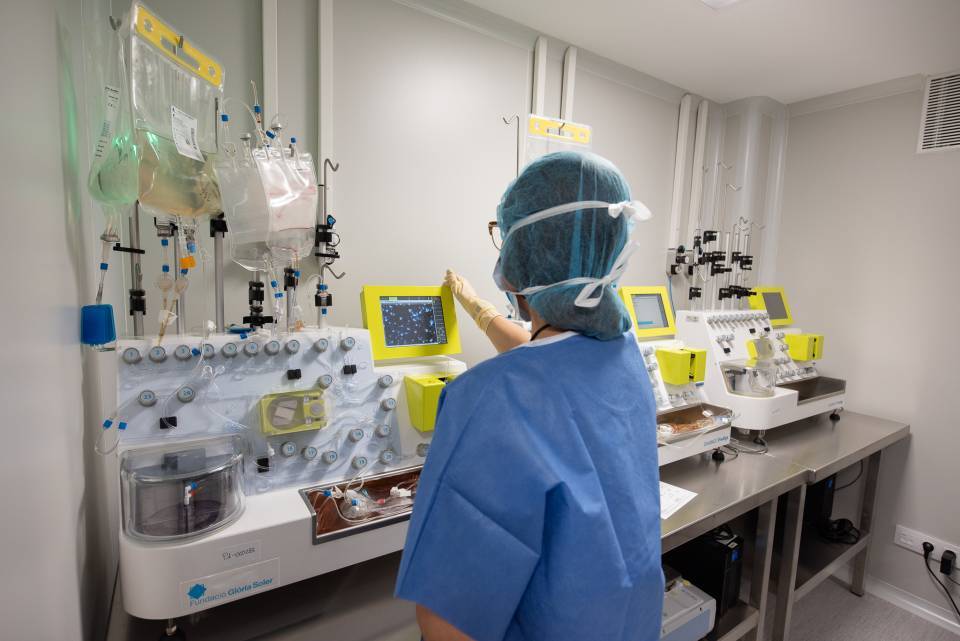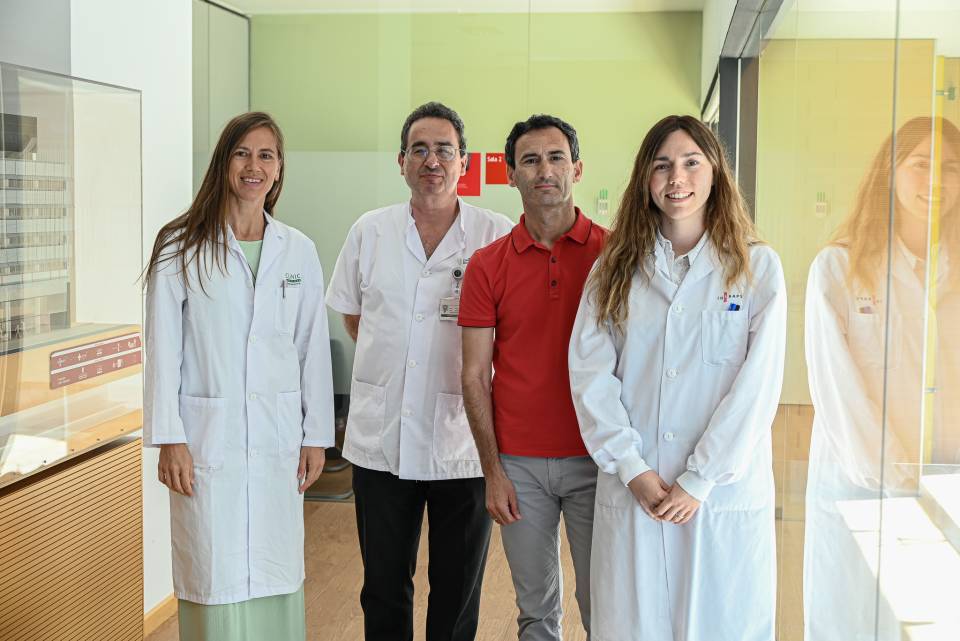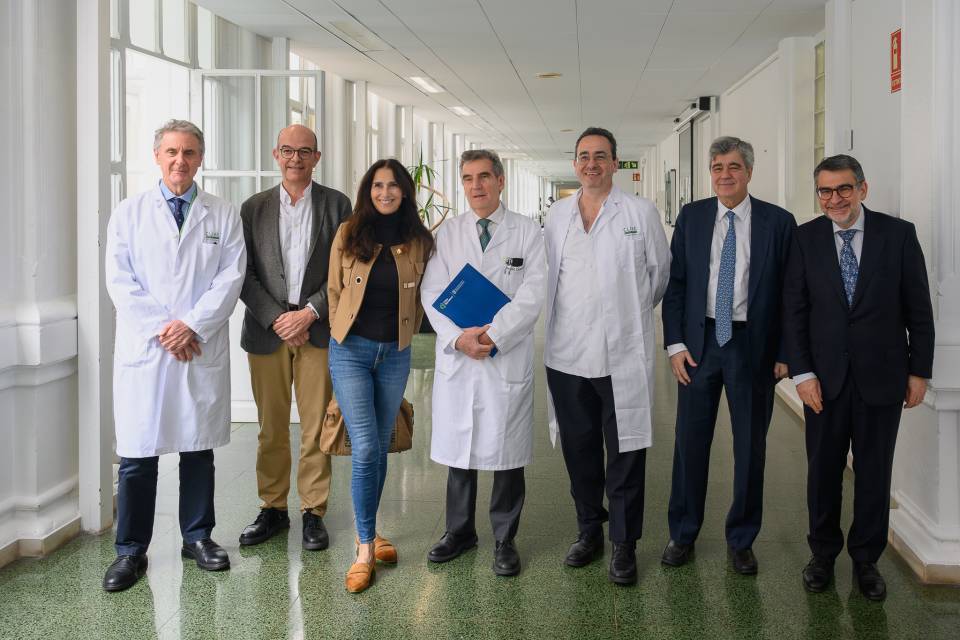The Department of Immunology participates in the following Units:
Clinical Immunology Section
Dr Juan Ignacio Aróstegui – Head of Section
In order to provide comprehensive departments for the diagnosis of immune-mediated diseases, the Clinical Immunology Section carries out its activities in four specialized areas.
- Immunodeficiencies
- Immunochemistry
- Innate Immunity
- Autoinflammatory Diseases
This deparment highlights the area of excellence in Autoinflammatory Diseases, where we are a national and international benchmark for the availability of techniques that allow us to offer high-precision diagnostics for highly complex pathologies, such as the study of genetic mosaicism evolution or transcriptomic techniques (for type I interferonopathies). In this regard, there is a continuous commitment to keeping up with the latest advances that enable us to offer diagnostic guidance and monitoring of immune-mediated diseases.
Other techniques we apply in this section range from specialized functional tests, state-of-the-art multiplex systems for diagnosis, and genetic studies for panels or next-generation sequencing (NGS). The deparment's professionals support the medical community by conducting clinical case consultations, solving diagnostic problems, and clinically interpreting test results, among other aspects.
Since 2012, the Section has participated in the Clinical Immunology Functional Unit, along with the Hospital Sant Joan de Déu in Barcelona, and works on joint research projects, as well as in reference healthcare units for the diagnosis and monitoring of immune-mediated diseases.
Immune Response and Hypersensitivity Section
Dr Mariona Pascal – Head of Section
This section covers the following areas:
- Autoimmunity
- Immunoneurology
- Immune Response to Drugs, Hypersensitivity and Immunoallergy
- Cellular Response to Viruses and Vaccines
In the field of drug response and immunoallergy, the multidisciplinary team works on the diagnosis and monitoring of allergic diseases and the monitoring of therapies with biological drugs. Using advanced analytical techniques, such as molecular diagnostics and in vitro functional studies, it offers personalized and efficient care.
With regard to neurological diseases of immune origin, the immunoneurology team combines clinical care with research to further the understanding and diagnosis of these complex pathologies. The use of techniques for the detection of autoantibodies and the identification of biomarkers allows for better treatment guidance and understanding of the pathophysiology of these disorders.
With regard to the cellular response to viruses and vaccines, in vitro studies are carried out using techniques such as ELISPOT and flow cytometry to analyse T lymphocyte activity. These tests are particularly useful in immunocompromised patients, since they allow cellular immunity to be assessed even if serology is negative, helping to determine the risk of infection or reactivation.
Finally, the autoimmunity area focuses on the detection of autoantibodies involved in systemic and organ-specific autoimmune diseases. Through techniques such as ELISA, immunoblot and flow cytometry, key biomarkers can be identified for the diagnosis and monitoring of pathologies such as inclusion body myositis, systemic lupus erythematosus and antiphospholipid syndrome.
Eduard Palou – Head of Section
Thanks to the agreement with CatSalut, the Immunology Service is recognized as the Histocompatibility Laboratory of Catalonia (LCH), which is the reference centre for histocompatibility (HLA) studies in organ transplantation in Catalonia. The laboratory stores, maintains and manages the waiting lists for kidney recipients, and plays a leading role in the coordination of the transplantation process at the autonomous community level. In addition, the Histocompatibility Laboratory of Catalonia is accredited by the European Federation of Immunogenetics (EFI).
The areas covered by the Transplant Immunology Section are as follows:
- Alloresponse
- Low-resolution HLA typing and disease association
- High-resolution HLA typing
- Organ transplant on-call shifts
In this regard, the laboratory performs HLA typing for all solid organ recipients in Catalonia and determines the anti-HLA antibodies of these patients. In addition, the Immunology Laboratory acts as a transplant on-call laboratory, performing HLA typing of all donors generated in hospitals in the Catalan network and cross-matching tests with potential recipients of different organs. To this end, it maintains a permanent on-call team 24 hours a day, 365 days a year. Thus, during 2024 a total of 1,652 immunological studies were carried out on new patients on the organ transplant waiting list, 486 HLA typings of deceased donors and 1,720 cross-matching tests between donors and recipients.
As a reference laboratory for organ transplantation in Catalonia, the Histocompatibility Laboratory is also responsible, along with the Catalan Transplant Organization (OCATT), for maintaining the waiting list of renal patients and coordinating the distribution of kidneys for transplantation. In this context, it provides assistance to the nephrologist on call in assigning the most suitable recipient for each donor. Moreover, it carries out post-transplant immunological follow-up with rejection monitoring.
On the other hand, it also carries out high-resolution HLA typing for different haematopoietic progenitor transplant teams, as well as HLA studies associated with various diseases. It also maintains a strategic alliance with the Immunogenetics and Histocompatibility Laboratory of the Blood and Tissue Bank (BST).
Immunotherapy Section
With the creation of this section in 2016, the Immunology Department expanded the services to include those derived from the field of immunotherapy. At present, it is the only centre in Europe that has obtained hospital exemption authorization for CART-19 and CART-BCMA therapy. In parallel with the development of analytical studies, which allow for a better understanding and management of conventional commercial immunotherapies (especially biological drugs), this section also manages the facilities for advanced therapies, known as white rooms.
The Immunotherapy Section is responsible for the production of cell therapies, mainly anti-tumour therapies, which include the use of dendritic cells, CAR T-cell therapy, and tumour-infiltrating lymphocytes (TILs), as well as monitoring the immune response to these therapies. The aim is to offer personalized cell therapy products, focused on immunotherapy against cancer, but without losing sight of other proposals such as anti-infective immunotherapy.
There are two main proposals in this section:
- The monitoring of our own immunotherapies or those developed by third parties. Of particular note are studies on the phenotypic definition of leukocyte subpopulations and the evaluation of cytokine profiles.
- The development of personalized cell therapy products. In this group, the following treatments have been developed:
- Vaccines with antitumour or tolerogenic dendritic cells.
- Adoptive transfer of T lymphocytes or TIL therapy in solid tumours, which selects the antitumour T lymphocytes present in the tumour
- Genetically modified lymphocytes. Of particular note is CAR T-cell therapy (chimeric antigen receptor-modified T cells), specifically CAR-T19 for the treatment of CD19+ B-cell leukaemia and lymphoma. The section is working on other similar proposals.
The Immunotherapy Section has a strategic alliance with the Hospital Sant Joan de Déu in Barcelona, with which it works on a joint immunotherapy platform and in the joint multidisciplinary unit for oncohaematology, immune-mediated diseases and advanced immunotherapies (DCs, TILs, and above all CAR T-cell therapy).


